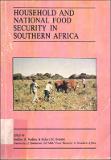| dc.description.abstract | My assigned topic is "Biotechnology and its potential impact on Food Security in Southern Africa." Biotechnology can and does encompass many things. As it is currently rather trendy, it seems to encompass almost anything to do with biology, agriculture or medicine.
My definition will, however, be fairly narrow-simply because today I have been allotted 20 minutes. Biotech is an assembly of modern techniques which gives us skills in two broad areas: tissue culture and recombinant DNA manipulation. First, tissue culture allows us to culture, keep alive, animal and plant cells in the lab, in the petri dish, in the test-tube, under sterile conditions--which permits growth and development of those cells.
Some of these cells can be manipulated with hormones and nutrition and physical conditions to express their totipotency, i.e., their inherent ability to develop from a single cell into a whole plant, a normal plant. If you start with one cell you get one plant, but if you start with a thousand cells (e.g., leaf mesophyll cells) you can potentially finish with a thousand plants, a thousand copies, a thousand clones of an original cell. I speak of plants because in some plants this is now routine. In animals, cloning is confined to a few experimental animals derived from embryos removed, split, cultured, and reinserted into the mother. When brought to term, the mother delivers cloned identical sibs (twins, triplets, etc.). In humans, no one has dared try as yet, but it is technically possible. | en |


